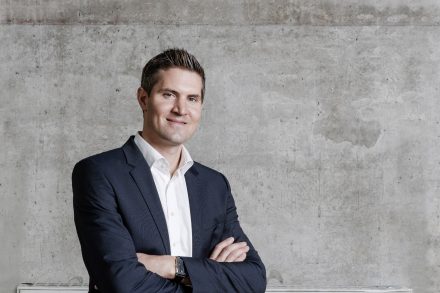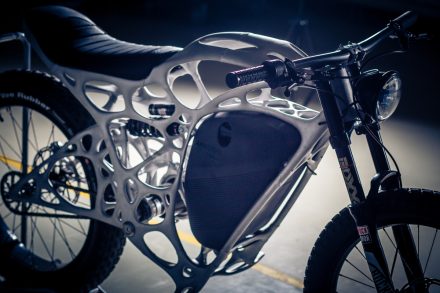Since its founding in 2013, the Airbus spin-off APWorks has been located on the Ludwig Bölkow Campus in Ottobrunn. The company uses aerospace expertise for terrestrial industrial applications. A particularly impressive example is Light Rider, a motorcycle produced using a 3D printer. Managing director Joachim Zettler took some time to answer a few questions for us.
What does APWorks do? Please tell us a little something about yourselves!
As a 100% subsidiary of the Airbus Group, APWorks specializes in the economic and technical optimization of components with a focus on shape and material, followed by additive manufacturing. The goal is to reduce weight, shorten manufacturing times, integrate additional functions into components, find the ideal material and even shorten assembly time. It also allows for the creation of geometric shapes that are significantly more complex. The best example is Light Rider. It is the world’s first motorcycle to be developed for and manufactured with 3D printing. To achieve the goals named above, the company takes existing aerospace concepts and makes them useable for different industries. Its customers include development departments and manufacturers from the robotics, mechanical engineering, automotive, medical engineering and aerospace industries.

Why did the Airbus Group make APWorks its own company instead of a new department? What are the advantages of a spin-off?
The goal was and continues to be establishing an agile entity on the market that is able to quickly and efficiently respond to customer wishes, making it best-in-class. More generally speaking as well, component manufacturing is not part of the core business conducted by Airbus. Similar to the spin-off of Premium Aerotec in 2009, it made more sense for APWorks to be its own entity from the group’s perspective.
“We still have some characteristics of a startup”
Are you a startup? How so?
No, we no longer view ourselves as a startup as such, after being active on the market for more than three years. Moreover, we have also been able to establish ourselves solidly in the robotics, automotive, toolmaking and aerospace industries, and are also on our way to becoming more international. That goes beyond the nature of a startup for us, even if we do still have some startup features, such as agility, speed and an extreme closeness to our customers.

What can established companies learn from startups?
Being agile is difficult for many companies. How can they quickly and flexibly respond to customer wishes and new market developments? That is the key question. However, it is no problem at all for companies that are young and relatively small. That is also the reason why an increasing number of large companies are spinning off innovation centers as well as innovative small companies. To a certain extent, everyone is still trying to emulate the Silicon Valley concept. In the end, it is always a matter of increasing speed to meet the needs of the market. That is also the aim of APWorks. The subject of flexibility and speed is essentially synonymous with additive manufacturing.
What are the up and coming trends? What direction are you headed in next?
When it comes to developing and manufacturing components, the current major issues are shortened manufacturing and lead times, weight reduction and functional integration. It is a matter of innovation, efficiency and cost savings. Rapid availability of spare parts is also an issue. The additive manufacturing offered by APWorks provides all of those elements, embedded within the triad of engineering, material and printing.
Just a few years ago, Airbus closed its facilities in Unterschleißheim and also cut jobs in Ottobrunn. Has APWorks been affected by the restructuring at Airbus?
No, as I said, APWorks is its own company and acts independently.
Airbus is a European company with countless locations. You are currently located at the Ludwig Bölkow Campus in Ottobrunn. What are the advantages of that environment? What makes the greater Munich area special?
The company location on the Ludwig Bölkow Campus provides short communication paths with Airbus colleagues in research and development, particularly in the materials sector. APWorks also benefits by learning about the latest developments in aerospace thanks to its location. In addition, the greater Munich area is a dynamic and international economic region that offers the ideal conditions for young, international companies like APWorks. The existing infrastructure gives different industries access to innovative services. Nonetheless, we also think and operate beyond Munich and view ourselves as an international company, regardless of where we are located.



